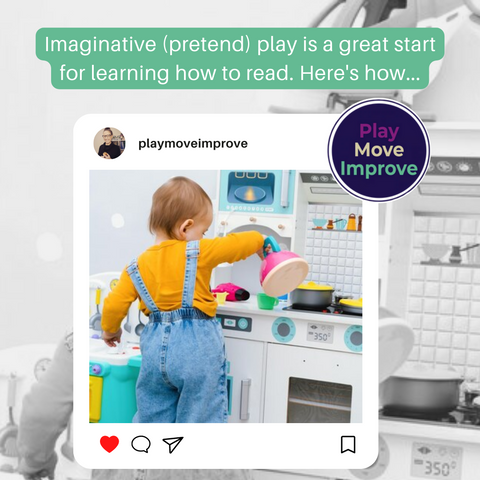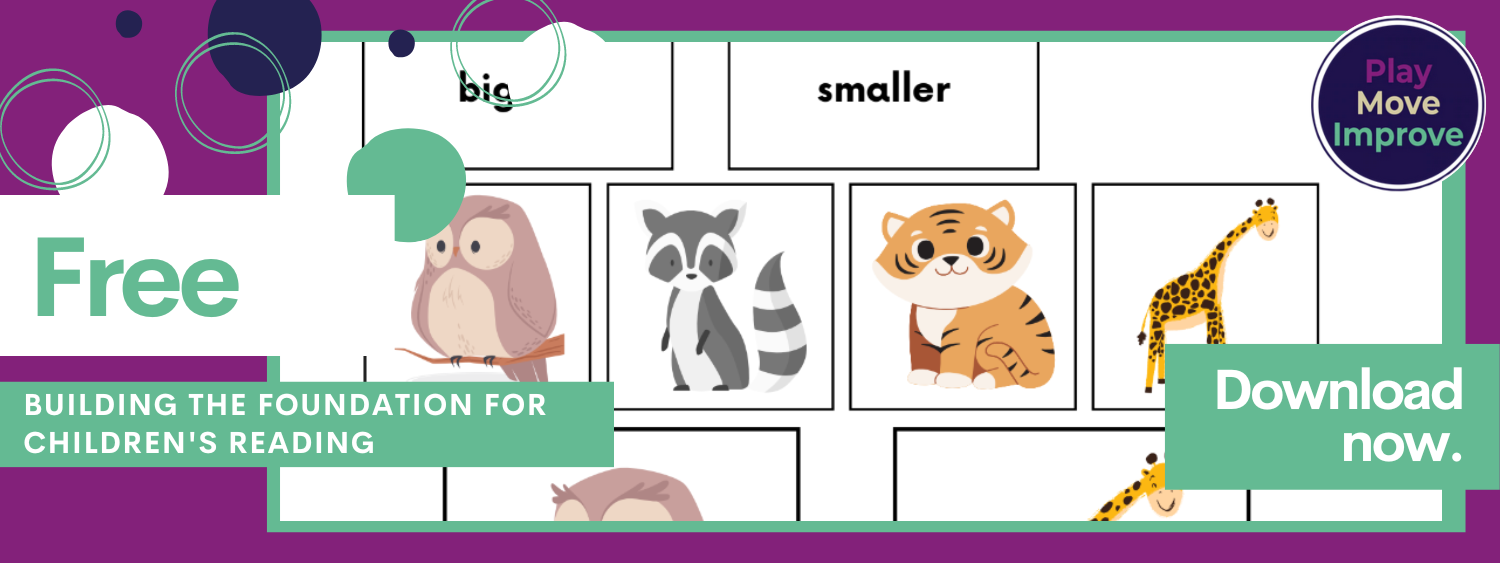
Play based learning for literacy skills
Share
There is compelling evidence that children’s play has an important role in the development of language and literacy during the early years (Pyle, et. al.; Roskos & Christie, 2013).
Play based learning is important for developing the foundation that the brain and body needs for learning how to read as play builds skills such as:
- Movement sequencing
- Problem solving
- Social skill development
- Self-regulation
- Language development
- Focus and attention
Let's observe the little one pictured above who is pouring a pretend cup of tea or coffee. In this picture above the child needs to be developing the following skills to be able to play this way.
Movement sequencing
- The child needs to put the cup onto the kitchen bench before pouring from the jug
- In order to stand upright with a strong torso, the child needs to be able to position their body so that they don't lose balance and fall over
- To be able to pour the pretend jug the child needs to have developed the skill of coordinating the sequence of their shoulder, elbow, hand and finger movements to be able to lift up the jug in this way, without knocking the cup over or dropping the jug
Problem solving
- If the child knocks the cup over with the jug, the child needs to solve the problem of picking the cup up off of the ground and adapting their movement next time so that they don't knock over the cup again
- If the child finds that the cup keeps sliding along the kitchen bench, or their plastic small biscuit keeps falling off of the plastic plate, the child needs to troubleshoot what's happening and change their movement, or change the type of jug, shape of cup, or size of biscuit/plate
- If their play mate or parent isn't reacting in their play as they had thought or hoped, the child needs to try and adapt their play behaviour to suit what's happening with their play mate or parent - do they need to talk more, gesture using their hands more, wait their turn, etc. so that they play successfully with others
Social skill development
- Problem solving rolls into social skill development because if we struggle to problem solve and get frustrated when the cookie drops on the floor, can't work out how to pour the jug without knocking the cup over, or struggling to wait out turn or negotiate with the person that we're playing with, then this conflict and frustration in our play may put the child off continuing to attempt to play with others
- Playing pretend cafes and cooking is fantastic for social skill development because it involves asking another person what they would like from the cafe, whether their cup is the colour that they wanted, whether their pretend cup of tea is too hot or too cold, whether their friend would like to sit and play at the table or on the ground
- Playing imaginatively also requires children to share play resources. This child may have a turn of the jug and then share the jug with their friend or parent, waiting for their next turn of the jug
Self-regulation
- Social play is extremely important for developing self-regulation skills because when we are playing with others we need to control our impulse to snatch the jug out of another child's hand so I can have a turn, shove the other child out of the way a little bit so I can get my body in front of the pretend kitchen sink, manage my big emotions when I feel frustrated about dropping the cup on the ground, or when the plastic cookie keeps falling off of the plastic plate
- We also build our skills in self-regulation when playing by regulating our excitement. If we're too excited to pour the jug near the cup then we may struggle with the movement sequencing component of this activity. If we're too excited to sit at the table with our friend and share a pretend meal, then our friend may move away from us and go play somewhere else. The more we practice playing near others, the more we learn to adapt our excitement level to the person that we're playing with and the activity. Our excitement level and movement level during outdoor running games, will be different to when playing indoors at the pretend kitchen. Learning how to play in both environments is important for children as they adapt to being at school, the supermarket, the library, a party, a park, etc.
Language development
- What I love about play is that it requires children to use verbal and non-verbal language. For example, when sharing a pretend cup of coffee we use verbal language like 'would you like a coffee', or 'cup'. We also use non-verbal language as we move our hand towards them with the cup, suggesting that they take the cup from our hand. Or we pretend to drink from the cup, wanting others to then also pretend to drink from their cup.
- The more we engage in play with others, with a range of different play resources, the more we build up our verbal and non-verbal language skills which is extremely important for reading and writing later on
Focus and attention
- As you can see, play involves a wide range of skills. To be able to practice and master these skills over time, we need to be able to maintain focus and attention on the play activities more and more as we age and get better at playing imaginatively
- For children who struggle to self-regulate, they may move from one activity to another very quickly, not being able to master skills as easily because they haven't spent long enough with the jug and the cup building up their spatial awareness practice, or they have struggled sitting at a table having a shared pretend cake and conversation with their friend because they've quickly jumped up from the table and ran outside
- Our goal with play is to start small with maintaining focus and attention and slowly trying to build up a child's time at each activity, working through the problems that they need to solve, and regulating their impulses and emotions more and more each time, so they can build and master these important play skills before we learn to read and write
How do these areas of development impact reading?
Movement sequencing
- Reading involves a range of movement sequences.
- We need to be able to keep our torso stable and upright so our eyes can move smoothly across the page without the body bending too far forward into the book, or too far backwards away from the book
- Our eyes need to move smoothly as a team, with both eyes looking towards the right as we read across the page, then working together as a team to come to the next line of words without losing our place on the page
- We need to be able to use our hands to hold the book still, and turn the pages one by one. This takes fine motor skill development which we learn when pouring the plastic cup and carrying the plastic plate of biscuits to the table
Problem solving
- There is a lot of problem solving skills involved in reading. How to turn the book up the right way if it's upside down, how to take our time to decode each word by working through the sound of each letter, how to ask for help from our parent or teacher if we get stuck on a word or if a sentence doesn't sound right
- We also need to problem solve when our hands are holding the book still, our eyes are getting tired because our core muscles are bending our body to close to the page, etc.
Social skill development
- Often at school we read as a group or in partners. This requires children to be able to wait their turn to read, be supportive of their friend who may need more time to sound out and decode the words, feeling confident to ask a question from their teacher if they feel stuck
- Playing socially with others also gives us more general knowledge about the world, our environment and the name of objects, animals, colours, shapes. We use these words from our play and our environment in our books as most books include words like 'ball', 'bike', 'cup', 'bat', etc.
Self-regulation
- Reading requires a great amount of self-regulation. We need to control our impulses to sit still with the book, rather than changing position frequently, keep our eyes focused on the words rather than looking around the room at the lights, posters, trees, other children
- We need to start and stop our eye movement so we can scan across the page. For example, we keep our eyes still and focused on the first word of the sentence, we then move our eyes to the second word, but need to stop (inhibit) our eyes on the second word because if we keep our eyes moving then we miss this word on the page. The skill of starting (initiation) and stopping (inhibiting) our movement is something that children practice when they play as they start (pick up the jug) and stop (put down the jug) their movement many times throughout the day.
Language development
- Playing with others gives children a wider vocabulary as they learn words like 'cup', 'pot', 'pan', 'red cup', 'black pot', 'frying pan'
- We need a strong vocabulary to be able to describe the pictures in the book and use our general knowledge to make sense of what is happening in the story
Focus and attention
- If a child is struggling to maintain their focus and attention when playing - being quick to give up on a complex activity and move onto the next activity, then stop wanting to do that activity and move onto the next activity, we can then imagine that they may find it challenging to maintain their focus and attention on the letters and words of a page as they're learning how to read
- Being able to maintain focus and attention when reading, firstly comes with practice with being able to maintain focus and attention when playing a ball game, completing a puzzle, taking turns in a board game, waiting for a friend to bake them a pretend cake, etc

